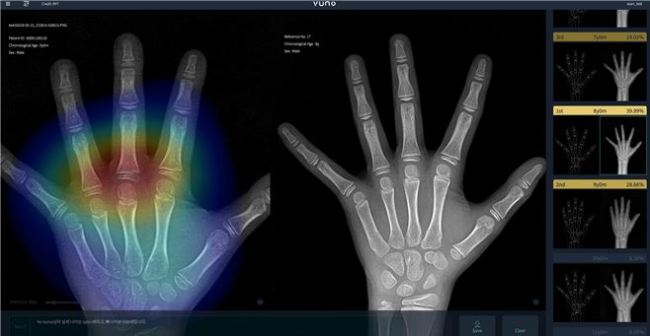South Korea’s Ministry of Food and Drug Safety said Wednesday that it has approved the first artificial intelligence-based medical device in the country.
The newly approved device is the VUNOmed-BoneAge, an image diagnostics device that uses a deep learning engine to read an X-ray scan of a person’s left hand to instantaneously determine his or her bone age, or skeletal age.
The device was developed by Vuno, a local medical artificial intelligence technology startup, in partnership with Asan Medical Center in Seoul.

VUNOmed-BoneAge (Ministry of Food and Drug Safety)
Vuno’s AI-powered device identifies a person’s skeletal age by comparing the inputted X-ray slide with a similar bone image preidentified as being of a certain age, and gives an instant diagnosis.
Previously, doctors would manually flip through a reference book to find an age-labeled bone image to compare to the image under scrutiny, a process taking five minutes or more.
According to Vuno, using the bone age diagnosis device can raise diagnostic accuracy by 8 percent and cut down the time needed for the diagnosis by 40 percent. Such findings were published in the American Journal of Roentgenology.
The device is designed for use at children’s growth clinics to predict how much more a child can potentially grow, or to guide a treatment plan for pediatric growth disorders such as growth hormone deficiency, according to Vuno.
The Korean startup is now working to get a number of other AI-powered image diagnostics devices approved within the first half of this year, including those that analyze X-rays and CT scans to diagnose lung cancer and macular degeneration.
Vuno is also working to obtain approval for diagnostic software that can predict the onset of cardiac arrest by analyzing a person’s vital signs.
The Korean Drug Ministry expects the global AI health care market to grow by a 60.3 percent compound annual growth rate, jumping from $70 million in 2015 to $750 million in 2020.
By Sohn Ji-young (
jys@heraldcorp.com)






![[Graphic News] More Koreans say they plan long-distance trips this year](http://res.heraldm.com/phpwas/restmb_idxmake.php?idx=645&simg=/content/image/2024/04/17/20240417050828_0.gif&u=)